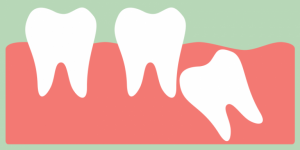Wisdom Teeth: Frequently Asked Questions
First one is, do I need to get my wisdom teeth removed?
In the vast majority of cases, the answer is yes. Over 90% of the people have at least one impacted wisdom tooth. This is the main reason why we take out wisdom teeth. Other reasons could be the patient could have a cyst, pathology, or damaged the adjacent teeth or cause crowding, especially if you’ve had orthodontics already performed.
Do you have to have them all done at one time?
The short answer is No. However, in most cases, it makes more sense to do it. You hurt once, rather than twice. You only have anesthesia all though very safe once rather multiple times. Actually, it will save you money in the long run by doing it in one procedure rather than multiple procedures.
What age should we get wisdom teeth removed?
It depends. We usually like to do it when teeth are one third to two thirds complete in root development. That is usually between the ages of 14 and 18 in most children. However, as they age the roots will continue to develop, they’re more likely to be into the sinus cavities, or close to, or touching a nerve. That’s why we like to do it when you’re younger. It just decreases the risk of complications, and also when people are younger, they heal quicker and bounce back from the surgery more rapidly.
How long will the procedure take? And what about the recovery?
Surgery typically takes less than 45 minutes after the I.V. is started and we begin sedation. As far as recovery, the worst days are usually days two to three post-operatively. The 48 to 72-hour window is typically when swelling peaks. At that time, usually the most uncomfortable. Following that, as the swelling starts to decrease, people start feeling better. Usually, a week out you’re still swollen and sore but you’re getting better and better every day. Usually about two weeks out, you might have a little bit of discomfort after eating a hamburger, eating a steak, having pizza or something like that.
How To Prevent Dry Sockets and How Common Are They?
First of all, they’re not very common. Around 3% of the population gets them after extractions. The main reasons for them are age over 24, smoking, as well as birth control pills. The other things we recommend, not to do is spit or drink through a straw. You don’t want to create any sort of suction that would actually cause a blood clot to come out. All a dry socket is, is when you remove the tooth, you have a blood clot that fills in the socket. If you lose that blood clot you have exposed bone and it’s painful.
What about diet, What should I eat after surgery?
My favorite things to eat after surgery, I would recommend eating mashed potatoes and applesauce. You’ll be numb after we finish up, so we don’t want you burning your mouth or chewing up your lip or your tongue. Those are both good food foundations for taking your medication. Once you start to get feeling back in your lip and tongue, you can go to warmer foods and harder foods such as spaghetti, scrambled eggs, pancakes, oatmeal, grits, baked fish, mac and cheese. These foods are recommended for the next several days. However, once you get feeling back, you can advance your diet as tolerated. If you overdo it, you’re going to regret it for a few days.
Can I keep my wisdom teeth after surgery?
The answer to that is yes, as long as you let us know ahead of time before we dispose of them, we’re happy to give them to you.
How will I act after surgery?
The short answer is we don’t know. The vast majority the people wake up just a little bit sleepy, feel pretty good but however, people are anxious sometimes can wake up emotional teary-eyed. Sometimes you can be a little cantankerous and ornery. It just really depends. We have noticed that once people turn on a video camera, they start to act a little crazier than they did beforehand.
We always love hearing from you guys and we love seeing your funny videos. Make sure to use the hashtag #aofsbham when you post so we can find them, share them, and periodically pick winners to give some prizes.



